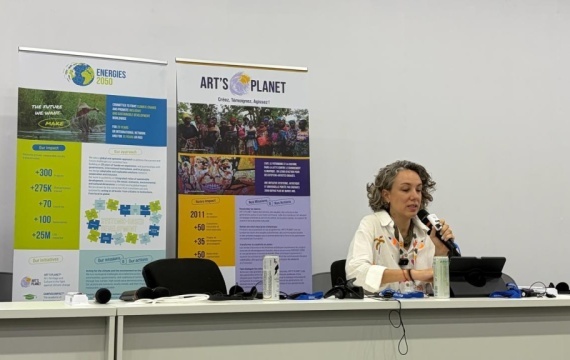COP30 Panel Highlights Indigenous Leadership and Culture as Pillars of Climate Action
On November 12, the COP30 Blue Zone hosted a session that united voices from different regions of the world to discuss pathways for resilience, justice, and cultural continuity in the face of the climate crisis. The panel focused on four interconnected themes: climate justice with inclusive decision-making, intergenerational transmission of ancestral knowledge, South-South and transcontinental cooperation, and the role of arts and heritage as instruments of climate diplomacy.
Moderated by Mariana Nicolletti, researcher at the Center for Sustainability Studies at Fundação Getulio Vargas (FGVces), the discussion emphasized the urgency of integrating cultural and social perspectives into global strategies to tackle climate change.
“It is essential to ensure Indigenous leadership in the design, implementation, and monitoring of climate strategies integrated with development policies and initiatives. These peoples and communities have already been experiencing profound transformations in their ways of life, in the natural environment, and in their relationship with nature, adapting through ancestral knowledge, culture, art, traditional wisdom, and also social technologies developed by current communities. There are important lessons to be learned from this.”, Nicolletti highlighted.
The researcher also stressed that Indigenous worldviews offer a vital connection to address today’s systemic crisis:
“This crisis is not only climatic and environmental but also involves key aspects of how we organize ourselves as a society and as an economy. We need to restore this deep integration between people and the environment to build lasting solutions.”
Among the key messages of the panel, Nicolletti pointed out the need to strengthen climate governance mechanisms, both internationally and nationally, ensuring the effective participation of Indigenous peoples and traditional communities:
“This means establishing proper procedures, reflecting this participation in decisions, and ensuring that these peoples are among the main beneficiaries, also considering the distributive dimension of climate investments and actions.”
Finally, the researcher emphasized that climate action goes beyond technology and politics:
“It is also cultural. Art and artistic expressions represent a powerful language to break barriers, foster dialogue and collective constructions, and reach innovative and creative solutions for this unprecedented crisis.”
The full coverage of Fundação Getulio Vargas’ participation in COP30, including agendas, exclusive content, and institutional contributions to global climate action, is available on the FGV Climate Agenda Platform.
